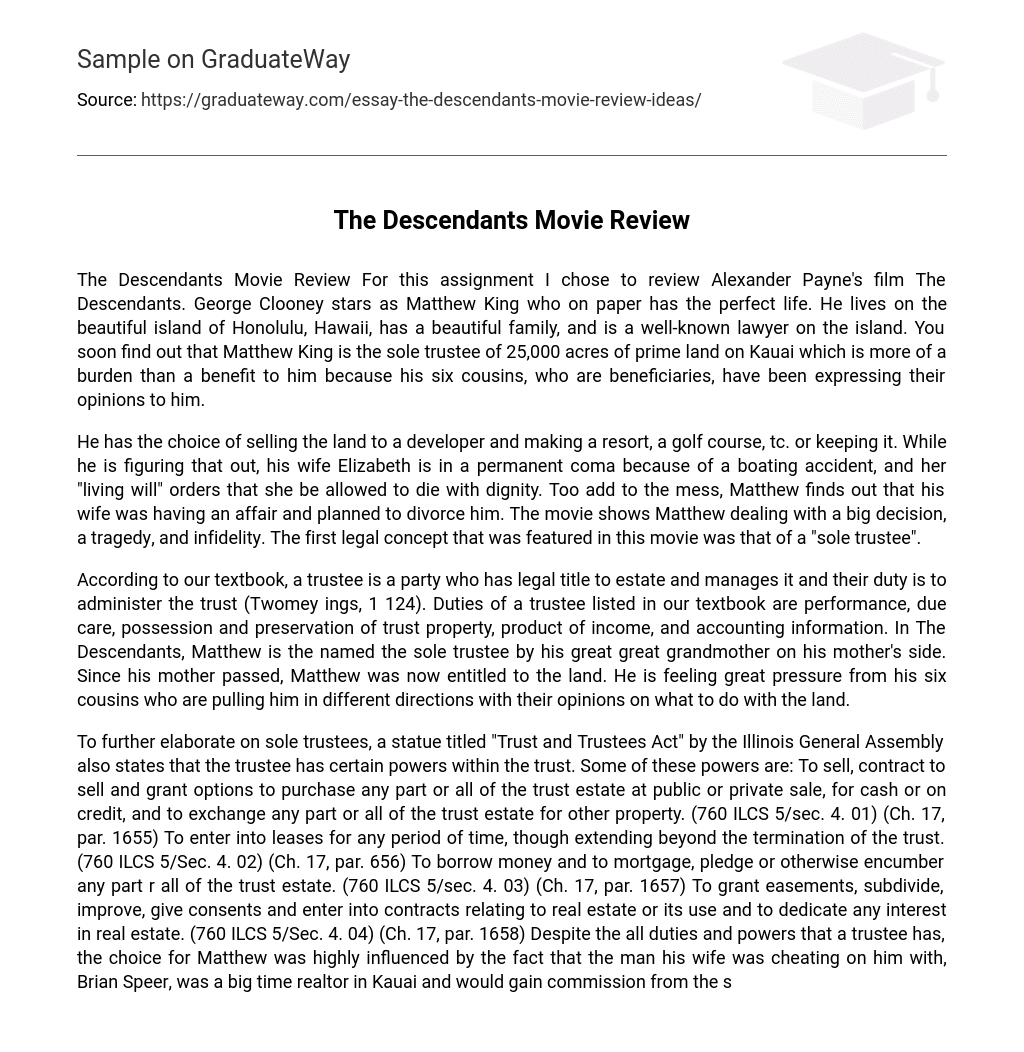This review will discuss The Descendants, a film directed by Alexander Payne. George Clooney plays the main character, Matthew King. Matthew lives a seemingly perfect life in Honolulu, Hawaii. He has a great family and is a respected lawyer. However, his life changes unexpectedly when he becomes the sole trustee for 25,000 acres of valuable land on Kauai. This new responsibility brings more challenges than benefits as Matthew must deal with constant opinions from his six cousins who are also beneficiaries of the land.
Matthew is confronted with a challenging decision: whether to sell the land to a developer for recreational use or retain ownership. Meanwhile, his wife Elizabeth is in a coma following a boating incident, and her “living will” specifies that she should be allowed to peacefully pass away. Moreover, Matthew discovers his wife’s betrayal and her plans for divorce.
The movie centers around Matthew’s struggles with a major choice, a heartbreaking event, and unfaithfulness. One principal legal concept explored in the film is that of a “sole trustee”. As defined in our textbook, a trustee is an entity that holds legal ownership of an estate and is responsible for its management. Their obligations include the administration of the trust (Twomey ings, 1 124). The duties assigned to a trustee, as outlined in our textbook, encompass performance, exercising due care, maintaining possession and preservation of trust property, generating income from the property, and providing accounting documentation.
Matthew has inherited the land as the sole trustee from his great great grandmother on his mother’s side in The Descendants. Following his mother’s death, he has now become the rightful owner. Nonetheless, Matthew is under immense pressure from his six cousins, each of whom has their own opinions on how to manage the land.
The choice for Matthew to become a trustee was greatly influenced by the fact that Brian Speer, the man his wife was cheating on him with, was a prominent realtor in Kauai who stood to gain commission from the sale of the land. This presented Matthew with a lot to consider. Another concept explored in the film was that of a “beneficiary,” which refers to the ultimate recipient of the benefit (Twomey&Jennings,626).
The Descendants focuses on the property of Kauai as the benefit, with Matthew’s cousins and the local realtors being the beneficiaries. The impact of Matthew’s decision not only affects the real estate industry and landscape on Kauai but also disrupts traffic flow. Occasionally, people’s greed or impatience can result in Unconscionability. In a web-based article published in 2005, The Court of Appeal dismissed the attempt by four trust beneficiaries to reclaim properties that had been taken over by their trustees over a decade ago. This article highlights the Pate family, who were assigned their interest in these properties.
In 1992, investment company Greetflow Ltd failed to assert their claim for an unreasonable and unjustified period of time. They stated that they were “lying low” until 2000, when they discovered that the funds had gained considerable value. In the Descendants, Matthew did not want to “lie low” in any way. He recognized the worth of the land and carefully considered whether to sell it or not. Another concept discussed was that of a “living will,” which is a document used by individuals to plan in advance regarding the extent of life-sustaining medical treatments they desire if they become unable to communicate their wishes while in an irreversible and incurable condition (Twomey, 1116).
Matthew’s wife Elizabeth sustained a severe head injury in a boating accident, resulting in an irreversible coma. As per her living will, the heartbreaking decision to remove her from life support was made, leaving Matthew and their daughters to witness her passing.
Interpreting a living will can be complicated, as demonstrated in the case involving Samuel M. Damon. Damon created a living will, and after his death, multiple parties including Petitioner-appellant Michael E. Haig and four groups of respondents-appellants questioned how the assets should be distributed. The circuit court concluded that, when distributing the corpus upon the trust’s termination, the starting point is Damon’s children. Consequently, the corpus should be divided into two equal shares, representing Damon’s two deceased children (Circuit Court 2006).
In the end, Matthew decided not to sell his land. Instead, he chose to keep ownership of it for now, giving himself more time to think about what he truly wants for the property and plan his next steps. The rule of perpetuities, which ensures land remains owned within a reasonable timeframe, allows Matthew seven additional years to consider his options; his cousins’ persuasion was simply a tactic to put pressure on him. After his wife’s death, Matthew gained a new perspective and desired to work less while focusing more on his daughters. Ultimately, Matthew longed for the opportunity to experience paradise, maybe for the first time in his life.





